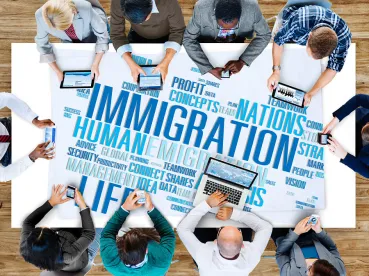On Oct. 8, 2017, the White House released the promised Immigration Principles & Policies (Principles & Policies) which outline the Trump Administration’s position on immigration. This document is broken into three parts: 1) Border Security, 2) Interior Enforcement, and 3) Merit-Based Immigration. A summary of each part is broken down below.
1. Border Security:
A. Border Wall: The Trump Administration proposes the construction of a wall on the U.S.-Mexico border. This includes requesting funding for the construction and associated infrastructure, as well as authorizing the Department of Homeland Security (DHS) to collect certain processing fees from immigration petitions and border crossings for the wall’s construction. In addition, the administration proposes improvements for infrastructure and security on the northern border.
B. Unaccompanied Alien Children (UACs): At the present time, UACs who enter the United States without inspection are released to the custody of a parent or family in the United States. The Principles & Policies state that this is a loophole in the law which prevents these children from being removed, resulting in increased illegal immigration. The administration proposes amendments to the current law so that UACs and their family units are removed from the United States, including:
-
Amend the William Wilberfroce Trafficking Victim Protection Reauthorization Act of 2008 to treat all UACs the same, regardless of country of origin, so long as they are not victims of trafficking and can be safely removed from the United States;
-
Terminate the Flores Settlement Agreement;
-
Clarify that minors who are accompanied by or who have parents or legal guardians in the United States be denied the UAC classification;
-
Amend the definition of “special immigrant”;
-
Remove adjudication jurisdiction from asylum officers.
C. Asylum Reform: This document includes asylum statistics showing there are more than 270,000 pending asylum cases at the United States Customer and Immigration Services (USCIS) and another 250,000 at the Executive Office for Immigration Review (EOIR). To combat deficiencies and fraud, the Principles & Polices propose to:
-
Tighten evidentiary standards for asylum cases;
-
Impose and enforce penalties where appropriate;
-
Clarify and enhance the definition of “aggravated felony” and prohibit those granted asylum or who entered as refugees to adjust to lawful permanent resident status if convicted of one;
-
Expand the ability of return.
D. Ensure Safe Border Returns: Due to the backlog at EOIR, the Principles & Policies propose adding another 370 Immigration Judges (and performance metrics), 1,000 ICE attorneys with support personnel, and ensuring that there are resources for detention.
E. Inadmissible Aliens: The Trump Administration proposes expanding the definition of inadmissible aliens to include gang members; those convicted of an aggravated felony and other crimes on an expanded list; and spouses and children of individuals engaged in drug and human trafficking if it is determined the relationship was a fraud or there are still benefits being gained through illicit activity.
F. Discourage Illegal Entry: The document proposes that those who have prior deportations and prior illegal crossings receive an increased penalty.
G. Facilitate the Removal of Illegal Aliens from Partner Nations: The document includes a proposal to grant DHS the authority and resources to help third countries with their immigration problems, as the ultimate destination country is the United States.
H. Expedited Removal: This is proposed for inadmissible and deportable aliens.
2. Interior Enforcement
A. Sanctuary Cities: The Trump Administration proposes blocking sanctuary cities from receiving certain grants and funding from the Department of Justice (DOJ) and DHS. Grants are to be restricted to states or local jurisdictions refusing to cooperate with DHS, and any entity that provides services or benefits to individuals not entitled to it. Grants are also restricted to state or local jurisdictions that provide a more favorable plea agreement for alien criminal defendants in consideration of immigration consequences. This also requires information sharing and the clarification of the “criminal conviction” definition.
B. Immigration Authority for States and Localities: It is proposed that states and localities have authority to investigate, arrest, and detain for immigration purposes. This also includes passing local legislation and entering into agreements with the federal government and granting certain immunities.
C. Visa Overstays: The document cites visa overstays as 40 percent of illegal immigration. The Principles & Policies propose preventing this through a number of measures, including:
-
Classifying a visa overstay as a misdemeanor;
-
Requiring the cancellation of all visas if one is cancelled;
-
Barring all visa overstays from immigration benefits for a period of time with no waiver;
-
Requiring data sharing by DHS;
-
Enhancing vetting of bond sponsors for those who enter without inspection;
-
Allowing the Department of State (DOS) more authority in their review.
D. Necessary Resources: A significant increase in resources is proposed, including an additional 10,000 ICE officers and 300 Federal prosecutors for immigration.
E. Detention Authority: Increased detention authority is proposed for DHS, including required detention for certain classes.
F. Legal Workforce: This document includes proposals to enhance employment verification to curb illegal immigration, including requiring E-Verify and increasing penalties for employers who are violators. This also includes a requirement for the Social Security Administration (SSA) to disclose information to DHS as needed for immigration purposes. The document also proposes to expand the definition of unlawful discrimination to include displacement of U.S. workers for foreign workers.
G. Deportable Aliens: The document proposes to clarify the definition of “aggravated felony” and includes a proposal to expand the definition of deportable aliens to include the following:
-
Gang members;
-
Those convicted of multiple drunk driving offenses or a single offense resulting in death or serious injury;
-
Those who fail to register as a sex offender.
H. Gang Members: Gang members and those associated with criminal gangs are prohibited from receiving any immigration benefits.
I. Visa Security Improvements: To assist the DOS in vetting visa applicants, there will be enhanced fees in various areas to assist with funding.
3. Merit- Based Immigration
The Principles & Policies propose ending “chain migration,” which typically refers to more family- based immigration. The document includes provisions to:
-
Limit extended-family chain migration. Spouses and children under the age of 21 shall be the only categories able to benefit from family- based green cards;
-
Establish a merit-based, points-based system for green cards;
-
Eliminate the Diversity Visa Program;
-
Limit the number of refugees per year.



 />i
/>i

